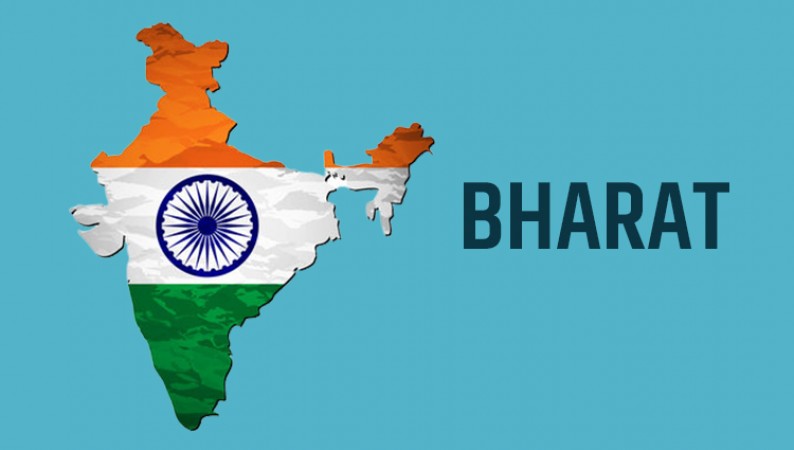
In the upcoming special session of Parliament, there is a proposal to rename India as Bharat, raising questions about the origins and significance of the word "Bharat." This potential change in nomenclature has ignited debates and discussions across the nation. To gain a comprehensive understanding of this proposed renaming, it's essential to delve into the roots of the term "Bharat" and explore its multifaceted significance.
The word "Bharat," rooted in the ancient Sanskrit language, carries profound meaning. It transcends its linguistic boundaries to symbolize a deeper quest for knowledge and enlightenment. For centuries, India has been known as Bharat, reflecting not just its geographical identity but also the spiritual and intellectual aspirations of its people.
The word "Bharat" literally translates to "to bear" or "to carry." It encapsulates the idea of bearing the torch of knowledge, signifying an enduring pursuit of wisdom. This interpretation underscores the intellectual heritage and rich cultural history that India embodies.
To understand why India is often referred to as Bharat, we need to unravel the intricate tapestry of historical references associated with this name. These references span across mythology, epic tales, religion, and cultural narratives.
In the Rigveda, one of the oldest sacred texts in Hinduism, Bharata is a revered king. He stands as the ancestor of the Bharata clan, a symbol of ancient lineage that laid the foundation for the Indian civilization we know today. The mention of Bharata in this ancient scripture underscores the deep historical roots of the name.
The epic Mahabharata, a cornerstone of Indian literature and mythology, introduces Bharata as the son of King Dushyanta and the sage Shakuntala. This lineage connects Bharata to the Kauravas and Pandavas, two legendary clans central to the Mahabharata narrative. The name "Bharata" here takes on the significance of being the progenitor of these illustrious families, further solidifying its place in Indian heritage.
In the epic Ramayana, Bharata emerges as the brother of Lord Rama, another seminal figure in Indian mythology. The presence of Bharata in this narrative underscores the interconnectedness of various mythological stories and their contribution to shaping India's cultural fabric.
Jainism, one of India's ancient religions, also weaves the name "Bharata" into its tapestry. Adinatha or Rishabha, the first Jain Tirthankara, is believed to have had a son named Bharata. This association highlights the religious diversity and cultural plurality that define India.
"Bharata" is credited as the author of Natyashastra, a significant text on dramatic arts. This scholarly attribution underscores the multifaceted nature of the name, ranging from mythology to artistic endeavors.
Beyond these prominent references, there are numerous instances of kings and sages bearing the name Bharata throughout Indian history. These historical figures contribute to the rich tapestry of the name's significance.
The term "Bharatvarsha" further extends the historical and geographical connotations of "Bharat." To fully appreciate its significance, we must explore its conceptual underpinnings.
"Bharatvarsha" is often traced back to Bharata, the son of King Dushyanta or, according to alternative sources, Bharata, the son of Rishabha. This connection emphasizes the deep-rooted nature of the name within Indian history.
According to Roshen Dalal in her book "The Religions of India," Bharatvarsha was considered a part of Jambudvipa, one of the seven islands or continents that comprise the world. This association places India in a broader global context, highlighting its role as a significant entity in the world's map.
The concept of "Bharat Mata" represents a more modern and symbolic interpretation of the name "Bharat." It has gained prominence in recent centuries, particularly during the struggle for Indian independence.
The emergence of "Bharat Mata" as a symbol of India is a relatively modern phenomenon, with its roots firmly planted in the latter half of the 19th century. The name "Bharat Mata" translates to "Mother India," imbuing the nation with maternal attributes, love, and devotion.
Early depictions of Bharat Mata often featured maps of India, emphasizing the geographic and cultural diversity within the nation. However, the concept evolved, and a physical manifestation of Bharat Mata took shape with the construction of a temple in Varanasi in 1936.
The temple dedicated to Bharat Mata in Varanasi was inaugurated by none other than Mahatma Gandhi, a pivotal figure in India's struggle for independence. His endorsement of this symbolism reinforced its significance as a unifying concept during a crucial period in India's history.
The proposed renaming of India as Bharat reflects a deep-rooted historical and cultural connection, drawing from mythology, literature, religion, and the diverse tapestry of Indian history. The word "Bharat" embodies a quest for knowledge and wisdom, making it a meaningful choice for the nation's identity. As India considers this change, it's vital to recognize that the name "Bharat" encapsulates the essence of a nation that has been in search of enlightenment for millennia.
As we navigate the complexities of identity, history, and culture, the name "Bharat" continues to carry the weight of a rich and storied heritage. It serves as a reminder of the multifaceted nature of India, a land that has thrived through centuries of growth and evolution.
NASA's LRO Captures Chandrayaan-3 Landing Site Image at Moon's South Pole